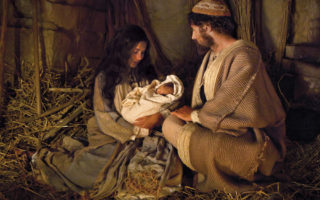Nearly every time I ponder writing something on this blog, I fight against the voices of doubt in my mind. It’s a stretching experience and that is uncomfortable. I often don’t know what to say or the best way to say it. What if nobody cares? What if I fail and others see that? The real issue is that I know there are others who can say it better than me-and I’m afraid of what that comparison will show.
We see this comparison trap in scripture. The disciples wanted Jesus to tell them who was the greatest-as they compared themselves with each other (Luke 22:24-27.) Peter compared his wish for a timely return to the presence of Christ with John’s desire to remain on Earth (John 21:20-22.) Moroni, as he wrote his portion on the plates, compared his writing to that of the brother of Jared and found himself wanting: “Lord, the Gentiles will mock at these things because of our weakness in writing…thou hast not made us mighty in writing like unto the brother of Jared…wherefore, when we write we behold our weakness, and stumble because of the placing of our words; and I fear lest the Gentiles shall mock at our words.” (Ether 12:23-25)
Theodore Roosevelt is credited with saying, “comparison is the thief of joy.” What he meant, of course, is that comparing ourselves to others breeds discontent, robbing us of the joy of our own accomplishment, efforts and small (and large) victories. When we judge ourselves by the arbitrary standard of what someone else has done or is doing, we run the risk of either feeling superior or inferior; either smugly thinking we’re better than another, or defeatedly thinking we’re worthless or less valued. Both sides of the comparison coin are dangerous, and both seem to come naturally to all of us.
We live in a world surrounded by comparison and competing. We tend to rank others and ourselves as ‘more’ or ‘less’ (which only makes sense in comparison to another)–more intelligent, more beautiful, less successful, less eloquent…. We are familiar with the limitations in mortality that foster comparison, as when there is limited space on a team or in a job, and we often transfer that circumstance to our perception of everything. Elder Holland said, ‘…every day we see allurements of one kind or another that tell us what we have is not enough. Someone or something is forever telling us we need to be more handsome or more wealthy, more applauded or more admired than we see ourselves as being. We are told we haven’t collected enough possessions or gone to enough fun places. We are bombarded with the message that on the world’s scale of things we have been weighed in the balance and found wanting.” (“The Other Prodigal,” Gen Conf, April 2002) And so we measure ourselves against others to judge our position and relative success. Pride is at the heart of this measuring and competitive view, and whispers that if we are not ‘as good’ as someone else, we must be lacking (or, conversely, that if we are ‘better’ than someone else that we are more worthy in some way.) Comparison is essentially a self-centered consideration; always concerned with our status in relation to someone else. It is exhausting and anxious!

Wonderfully, God does not measure us in this way. He is the generous and perfect custodian of our self worth. He is not limited in His capacity for love, nor is His kingdom limited in any way. There is room for all! He does not compare us to anyone else. He tells Moroni that “fools mock [when comparing]…but…my grace is sufficient for the meek, that they shall take no advantage of your weakness.” (Ether 12:26) He reminds Moroni that all we need to do is bring our weakness to Him and He can transform and strengthen us. (Ether 12:27) His grace is sufficient for all His children. No limits! His gifts to one do not diminish another. His blessings given to one, do not deplete His love for another. His perfect love is the only true way to measure ourselves, for only He sees all of the variables and abilities clearly in each of us. “…No one of us is less treasured or cherished of God than another…He doesn’t measure our talents or our looks; He doesn’t measure our professions or our possessions. He cheers on every runner, calling out that the race is against sin, not against each other….[T]here is a perfectly tailored robe of righteousness ready and waiting for everyone, ‘robes…made…white in the blood of the Lamb. (Revelation 7:14)” (Holland, ibid.) When we resist comparing ourselves to others, we free ourselves to find contentment and peace in our current progress and our potential; we free ourselves to rejoice in others’ successes and triumphs, and mourn with them in their failures. We open ourselves to feel God’s unique love, approval and encouragement for each of us. It is when we come to live in this way-like the Savior-seeking only for God’s sanction in our lives, that we are freed from the weight of comparison and competition. We surrender the pride and self-centeredness that prevent use from seeing things as they really are and free ourselves to humbly discover the joy He promises in this life-to all of us.




